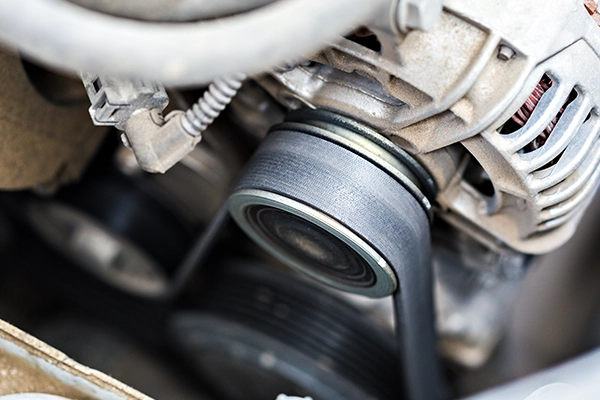If you’ve ever turned your key and immediately heard a high-pitched squeal emanating from the engine, you likely understand how disconcerting this sound can be. In this article, we’ll go over why your engine may be squealing, how these problems occur, and how you can prevent them from occurring in your vehicle in the future.
Common Causes of Squealing From Engine
Loose Accessory Belt
The accessory belt is responsible for driving the various systems that rely on direct rotation driven by the engine, including the alternator, power steering pump, A/C compressor, and water pump. Over time, this belt can wear down as a result of old age, allowing it to stretch or slip and loosening the belt’s connection to each of the pulleys.

The loose belt will rub against the pulley as it runs, creating friction that leads to the dreaded squealing noise.
Loose Timing Belt
Similar to the accessory belt, the rubber material of timing belts can degrade and stretch over time, allowing the belt to run looser and produce friction. Issues with the timing belt are generally more serious than a faulty accessory belt as the timing belt is responsible for the precise actuation of valves that our engines need to run properly.
When the timing belt fails, it can cause irreparable damage to the internals of the engine, such as colliding valves or mistimes combustion. If you suspect your timing belt is squealing, you should have your vehicle inspected by a trusted professional as soon as possible to avoid further harm.
Bad Belt Tensioners
Belt tensioners are responsible for keeping the belt pulled taut against the pulleys to avoid slipping or loose connection, however when a tensioner fails, it may allow the belt to run much looser than intended, even if the material of the belt itself is in good shape.
A faulty belt tensioner on the timing belt can cause similar failures to a faulty timing belt, as it may loosen to the point of disrupting the combustion cycle.
Power Steering Whine
While not a component of the powertrain, a faulty power steering pump or old power steering fluid can cause a similar squeal that’s directly affected by the engine’s current RPM, making it easy to confuse with the other issues listed.
With old power steering fluid or a failing pump, the pump must work much harder to maintain hydraulic pressure in the steering rack, leading to a squeal. Since the power steering pump is driven directly off of the engine’s accessory belt, the squealing noise will often worsen as the vehicle is accelerated.
Powertrain Service & Repair in Florissant, MO
If you’re experiencing a squealing noise from around your engine, or any other issues with your vehicle’s powertrain or timing system, don’t hesitate to reach out to the team at Gary’s Auto Service in Florissant, Missouri.
Our technicians have the expertise and equipment to provide your vehicle with the utmost quality of engine and timing maintenance. No matter what you drive or the service your engine needs, give us a call or schedule online with the friendly team at Gary’s Auto Service today!
